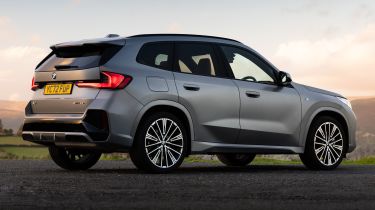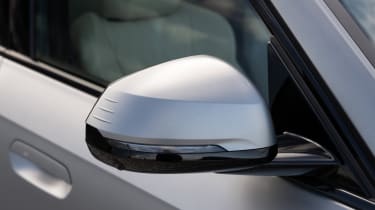BMW X1 SUV - MPG, running costs & CO2
BMW offers the X1 with a wide range of efficient powertrains – there’s even a fully-electric model
SUVs aren’t exactly known for being the most efficient cars on the road; however, the BMW X1 is available with a variety of fuel-sipping powertrains that make this premium SUV much less expensive to run than you might think. There’s even a pair of plug-in hybrids, plus a fully-electric BMW iX1 available for the first time.
BMW X1: MPG & CO2
Apart from the entry-level sDrive18d diesel model, all petrol and diesel versions of the BMW X1 are fitted with 48-volt mild-hybrid technology to help enhance efficiency. Because of this, both the sDrive18d and the more-powerful (all-wheel drive) xDrive23d diesels will both return around 55mpg; BMW says the latter is actually slightly more economical. That version emits 131g/km, which undercuts the equivalent Audi Q3.
There are two petrol engines: the sDrive20i and the xDrive23i. Again, there’s not much to separate the two when it comes to fuel economy, with the less-powerful version (44.8mpg) pipping its brawnier brother by around 4mpg on the WLTP cycle. CO2 emissions stand at 136g/km for the 20i Sport, rising to 152g/km for the 23i on the bigger wheels.
The two plug-in hybrids are, by far, the most efficient models in the lineup. Provided you keep the battery charged up and use electric power most of the time, BMW claims the xDrive25e and xDrive30e will return up to 352mpg. Both can travel up to 57 miles on electric power alone, depending on exact specification and how you drive – 20 miles more than the equivalent plug-in Mercedes GLA.
With the exception of the all-electric iX1, the plug-in hybrids are the best choice for company car drivers; they emit as little as 17g/km of CO2, placing them in the 8% Benefit-in-Kind tax bracket. Petrol and diesel models will likely solely appeal to private buyers as their high Benefit-in-Kind rates will make them expensive to run for company car drivers, despite being cheaper to buy outright or finance.
Examples of the X1 that cost under £40,000 will be charged the standard rate for VED road tax (£10 less for mild-hybrid versions). However, top-spec cars – including both plug-in hybrids – that cost over £40,000 will be liable for an extra surcharge when you pay road tax in years two to six of ownership.
Insurance groups
Insurance groups for the latest BMW X1 start at group 24 for the basic sDrive18d Sport, rising through group 31 for the faster xDrive23i M Sport. A mid-spec plug-in hybrid is in group 30, while a top-of-the-range, pure-electric iX1 sits in group 38. These numbers largely mirror the previous generation car and are competitive in this part of the market.
Warranty
Like all BMWs, the X1 is covered by a three-year, unlimited mileage warranty. While this is the same as what’s offered with the Mercedes GLA, mainstream rivals such as the Kia Sportage have warranties that extend up to seven years.
Which Is Best?
Cheapest
- NamesDrive 20i MHT Sport 5dr Step Auto
- Gearbox typeSemi-auto
- RRP£36,200
Most Economical
- NamexDrive 25e Sport 5dr Step Auto
- Gearbox typeSemi-auto
- RRP£42,670
Fastest
- NameM35i xDrive 5dr Step Auto
- Gearbox typeSemi-auto
- RRP£50,935

















